COMPARATIVE ANALYSIS OF ISLAMIC CULTURE IN INDONESIA AND THAILAND: INFLUENCES, PRACTICES, AND SOCIETAL IMPACTS
DOI:
https://doi.org/10.54443/siwayang.v3i4.2705Keywords:
Islamic Culture, Indonesia, Thailand, Comparative Analysis, Southeast AsiaAbstract
This study examines the similarities and differences in Islamic culture between Indonesia and Thailand, two Southeast Asian nations with significant Muslim populations. Although both countries are diverse in their cultures, the expressions of Islam are shaped by historical, social, and political contexts. Through a qualitative comparative analysis, the research highlights key cultural practices, religious interpretations, and community engagement in both nations. Indonesia, known for its moderate Islamic practices, shows a blend of local traditions, while Thailand presents a unique perspective with its predominantly Buddhist landscape influencing its Islamic minority. The findings suggest that the interaction between Islam and local cultures creates distinct manifestations of faith and practice. This paper contributes to understanding the broader implications of religious diversity and cultural identity within Southeast Asia.
Downloads
References
Al-Attas, S. (2001). Islam and the Challenge of Modernity. Islamic Studies Journal, 40(3), 355-374.
Armstrong, K. (2000). Islam: A Short History. New York: Modern Library.
Arifin, I. (2015). The Role of Islamic Organizations in Indonesia: A Historical Perspective. Journal of Contemporary Religion, 30(1), 75-92.
Barker, E. (1998). The Cultural Life of Muslim Communities in Southeast Asia. Journal of Religion in the Society, 78(2), 145-167.
Buehler, M. (2013). The Politics of Islam in Indonesia. Journal of Democracy, 24(4), 145-159.
Che Salmah, C. A. (2015). Islam, Culture and Education in Thailand: Reflecting Upon Marginalization. International Education Studies, 8(6), 136-144.
Faruk, A. (2018). Community Engagement in Islamic Practices: Evidence from Indonesia. Journal of Community Psychology, 46(3), 323-335.
Geertz, C. (1968). Religion as a Cultural System. In The Interpretation of Cultures (pp. 87-125). New York: Basic Books.
Hasbi, S. (2016). Traditional versus Contemporary Practices: The Challenge of Modernity for Islam in Indonesia. International Journal of Cultural Studies, 19(4), 355-367.
Hussin, M. (2012). Navigating An Islamic Identity in a Buddhist Society: The Case of Southern Thailand. Comparative Sociology, 11(2), 289-308.
, D. (2017). Islamic Practices and Cultural Identity in Southern Thailand. Asian Journal of Humanities and Social Sciences, 3(2), 90-105.
Khairuddin, R. S. (2001). Islam and Syncretism in Indonesia. Southeast Asian Studies Journal, 24(1), 58-77.
Luangthongkum, T. (2009). Muslim Identity in Thailand: The Challenge of Integration. Asian Ethnicity, 10(3), 299-312.
Muthalib, A. (2020). Interfaith Dialogue among Indonesian Muslims: A Case Study. Journal of Social Issues in Southeast Asia, 35(2), 209-225.
Nuryanti, I. (2018). Local Wisdom and Islamic Practices: A Case Study from Indonesia. International Journal of Asian Social Science, 8(7), 385-394.
Salim, A. (2021). Islamic Identity in Indonesia: The Influence of Social Movements. Indonesian Journal of Islam and Muslim Societies, 11(2), 191-216.
Slocomb, P. G. (2006). The History of Islam in Thailand. Southeast Asian Studies Review, 3(1), 23-42.
van Doorn-Harder, N. (2006). Islam, Gender, and Social Change in Indonesia. Journal of Southeast Asian Studies, 37(2), 287-306.
Vassallo, J. F. D. (2011). Comparative Studies on Islamic Cultures in Southeast Asia. Journal of Islamic Studies, 22(3), 359-377.
Wahid, A. (2004). Pluralism and Commercialization of Islam in Indonesia. Indonesian Journal of Islamic Studies, 42(4), 215-230.
Downloads
Published
How to Cite
Issue
Section
License
Copyright (c) 2024 R. Rudi Alhempi, Sineerat Suasungnern

This work is licensed under a Creative Commons Attribution-NonCommercial 4.0 International License.











